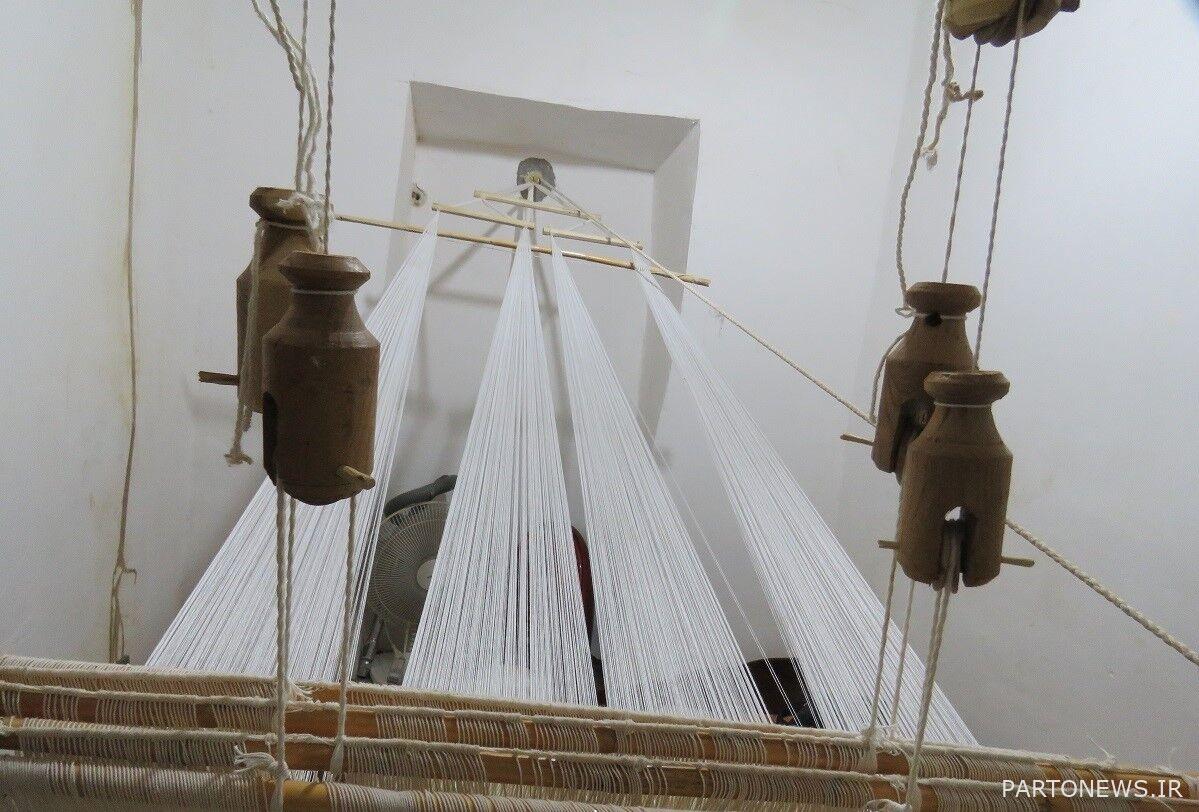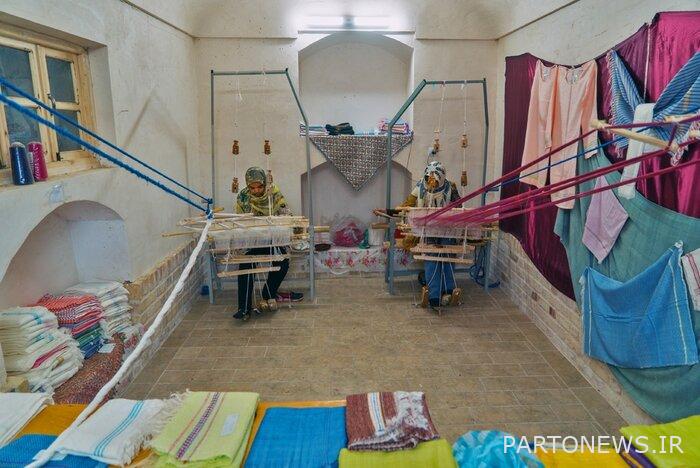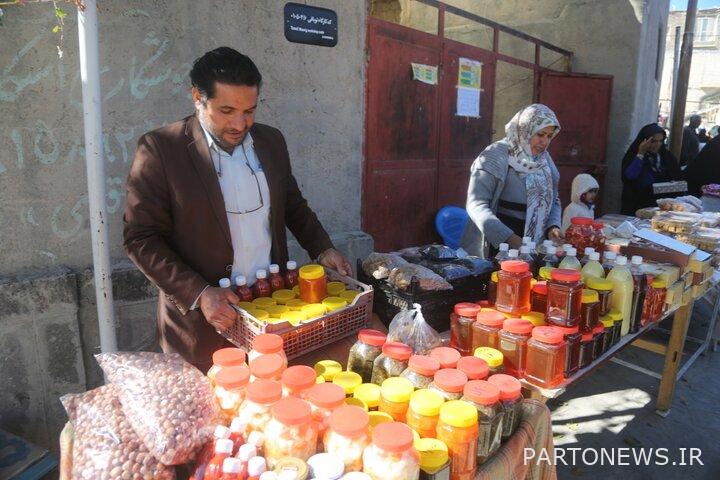Tobafi Khorashad; Four years after globalization

Tubafi, an industrial art with more than three centuries of history in Khorashad, was forgotten in the dust until a group of women decided to revive it, and now four years have passed since this tourist village was registered as a world handicraft village. It is a kilometer from the city of Birjand, which was nationally registered in 1396 under the title of Tobafi (towel weaving) handicraft village, and a year later it was internationally registered.
Tobafi (towel weaving) is a handcraft that was common in Khorashad and its surrounding areas more than 300 years ago, but later it was forgotten and buried in the dust under the trash until a hardworking lady from the same village, with a spark in her mind, He thought of reviving the art of repentance.
Fatemeh Zakarian compassionately went to breathe the soul on the body of Art Tubafi in Khorashad and other women of the village joined her. The result of all efforts was that with the announcement of the World Handicrafts Council in 2017, the village of Khorashad from South Khorasan was introduced as the world village of Tubafi.

He recounted the story of Tobafi’s revival in such a way that one day a tourist from Tehran came to Khorashad and asked for a handmade towel to be prepared for him. A towel that has not been produced for several years and only a few old people have it in their chests, they are not willing to sell it at any price.
It was here that the return of a Tehrani traveler empty-handed was painful for this entrepreneurial lady, and from there on, she decided to revive the bankrupt Khorashad cooperative company with the help of the women of this village.
Zakarian said: I told my idea for the first time in a Qur’anic meeting with the village women, but what they gave me was mocking laughter, which of course was not important, so I visited all the houses that I thought had a penance machine. Every house I entered had old pestos closed, but I was not disappointed.
He made his way to the dusty warehouses of old houses in the village and pulled Tobafi’s shoulders from under the dirt. In order for Tobafi to walk again, insisting on him and denying the women of the village; Because they no longer considered this work worthy of dignity.
Finally, he took out the tubafi equipment from a warehouse, took it to the village aqueduct and poured it into the water to wash away the dust of oblivion, and then he started working with some like-minded women.
After many years, the first repentance house was established in Khorashad, and a person started to repent under the condition that no one knows his name.
In the following weeks, other machines were pulled out from the basements and within 2 years, 42 women got jobs in Khorashad.
After that, by participating in various exhibitions, Khorashad became famous under the name of “Tobafi” and it was not long before the efforts of the women of the village made Tobafi Khorashad take the title of a national handicraft and the villagers became national in 2016. They celebrated this original art.
But the nationalization of Tobafi did not convince them, so they continued their efforts and a year later, Khorashad became the international village of handicrafts. Now this village is known as the second world handicraft village in the country after Kalpurgan in Sistan and Baluchistan.
Earning money for the women who started doing tobafi made them happy and now every house in Khorashad has become a tobafi workshop, but this is not the whole story.
What happened to Tobafi Khorashad after globalization? This is a question that we will address in this report, and the CEO of Khorashad Birjand Rural Cooperative Company said in response to this question: Production has become more prosperous than before, but we do not have a good sales market. The country has had a negative impact and we have not had orders from abroad in the last 2 months.
Fatemeh Zakarian added: The employment that was created after the globalization of Tobafi is still thriving and the trainings are followed especially in the summer season.
He said: The establishment of the Tobafi specialized center, which is one of the achievements of the globalization of this art, has achieved good results in the education of those who are interested, and in addition to that, other centers and schools are also training Tobafi in the province.
This entrepreneur lady pointed out that the training of Tobafi is also done in the prison and stated: We have started the training of Tobafi since last year in Nesvan prison and about 50 people have been trained, which can be used as a job and source of income after being released from prison. follow
333 people are members of Khorashad Women’s Rural Cooperative Company, and the group’s work routine is such that they are with the students from the beginning of training to the beginning of employment, and they are accompanied at all stages of installing the machine, cheleh, and starting to weave.
Zakarian mentioned the employment of more than 80 Tobaf women in the outskirts of Birjand city and added: We buy all the products produced by these women for the cooperative company so that they have an incentive to continue working.

In this article you will read:
Selling an exhibition is one of Tubafan’s problems
He stated that 75 workshops are also active in Khorashad village and said: One of the current problems of Tubafan is exhibition sales, so that the amount of sales has decreased and recent events in the country are one of the reasons. The price of raw materials and other production costs, the final price of the product is increasing day by day.
Zakarian said: It is expected that the costs of attending the exhibition for Tobafi’s world art will decrease, because the artist does not get much profit with the current conditions, sometimes attending the exhibition is harmful for the artist, so the motivation to continue the work decreases.
He added: This is while the time of Tobafi’s globalization was clearly announced, wherever the exhibition is held, a free booth will be provided to the village of Khorashad, but in fact, this issue is seen very little, so it is included in some exhibitions, but in others Other fairs are no different between world craft and non-crafts.
This entrepreneurial lady said: Khorashad village had three booths in the national handicrafts exhibition that was held in Birjand from the 7th of Azar, which is expected to sell well in this exhibition.
Tubafi has left the production of towels and moved towards conversion industries, so the fabrics produced are used for bathing suits, baby clothes, men’s shirts, hats and scarves.
Stating that after globalization, Tobafi became more practical than before, he said: Tobafi has left the production of towels and moved towards conversion industries, so the fabrics produced are used for bathing suits, baby clothes, men’s shirts, hats and scarves.
Zakarian continued: We don’t have any particular problem in supplying raw materials, but the price is increasing day by day, which affects the final price of the product.
Registration of 2 brands for Tobafi Khorashad
He announced the registration of 2 brands for Tobafi Khorashad and said: Genti and Tobaf brands are registered and through them the products are sold in domestic and foreign markets.
The CEO of Khorashad Women’s Rural Cooperative Company reminded: Three training centers affiliated to this company are active in South Khorasan province and so far 2 thousand people have been trained in this way.
Referring to the expansion of Tobafi training outside the province, he said: We have applicants for Tobafi from most of the provinces, and we have tried to send a trainer from Khorashad village so that this art is more popular in the country.
The employment of 10 thousand artisans is due to the globalization of Khorashad
However, according to the Deputy of Handicrafts of the General Department of Cultural Heritage, Tourism and Handicrafts of South Khorasan, one of the goals of the globalization of a village to the special field of handicrafts is to make it colorful and to emphasize the sale and introduction of the advantageous industries of each region.
In an interview with IRNA reporter, Hassan Ali Fuladi added: Khorashad was registered in 1396, and in 1397, due to the number of Tobafi workshops, the theme of its globalization gained strength and became a reality.
Referring to the benefit that South Khorasan gained from the globalization of Khorashad, he said: Before globalization, the number of Tobaf weavers in the whole province did not reach 500, but now we have more than 10,000 artisans who owe the globalization of Khorashad.
The Deputy of Handicrafts of the General Department of Cultural Heritage, Tourism and Handicrafts of South Khorasan said: After the global registration of Khorashad, the attention of managers and information networks was directed to this village, so after that, the most handiwork training was in Tobafi area.
He said: The demand for repentance training increased to such an extent that we were not even able to respond to clients from other provinces.
Training courses have been conducted in most of the provinces with the help of instructors from Khorashad village, so the trainings have gone to Bandar Abbas, Zanjan, Zahedan, Kerman, Mashhad and other provinces, which is the result of the globalization of Khorashad village.
Fuladi added: Training courses have been conducted in most of the provinces with the help of trainers from Khorashad village, so the trainings have gone to Hormozgan, Zanjan, Sistan and Baluchistan, Kerman, Khorasan Razavi and other provinces, which is the result of the globalization of Khorashad.
He stated: The amount of traditional textile sales of South Khorasan increased after globalization and the custodian and non-custodian institutions came into use, therefore the construction mobilization, the relief committee, welfare and other institutions pushed the target community towards repentance.
Tobafi Khorashad in world markets
The Deputy of Handicrafts of the General Department of Cultural Heritage, Tourism and Handicrafts of South Khorasan emphasized that the amount of product export increased after globalization and added: The international community usually focuses on the direction of having a globally registered brand.
He said: It is not possible to give an exact amount of Tobafi product sales because almost all stores and exhibitions sell traditional Khorashad fabric products in a mixed form and usually they do not want to announce the sales amount, but the export of traditional textile products of the province to Switzerland. It is done in Germany, France and other countries.
Fuladi stated: The global registration of Khorashad Tubafi has also boosted the production of tools, equipment and raw materials.
Referring to the recent visit of the governor of South Khorasan to Khorashad Global Village, he added: In this visit, a favorable promise was made to pay one billion tomans for the construction and operation of a handicraft market, a collective workshop and the secretariat of Khorashad Global Village.
Nevertheless, this official named the land supply as one of the current problems in the construction of a handicraft bazaar in Khorashad village and said: “If we reach an agreement with the housing foundation on this issue, we hope to be able to start the implementation of the bazaar in the next 6 months.”
The boom of ecotourism with the globalization of Khorashad
He stated that besides traditional fabrics, the sale of other agricultural products, livestock and handicrafts in Khorashad village flourished after globalization, and he clarified: the establishment of the Friday market in the village and the increase in the construction of ecotourism lodges are among the other effects of the globalization of Khorashad.

Fuladi added: Currently, more than 50% of the ecological residences of Birjand city have been built in Khorashad region and surrounding villages.
Another feature of Khorashad is that every exhibition is held in any part of the country, the World Village has a free booth.
The Deputy of Handicrafts of the General Department of Cultural Heritage, Tourism and Handicrafts of South Khorasan said: plans are being pursued even outside the country to provide a free booth to Khorashad Global Village.
He said: On an average, 20 to 30 national handicraft exhibitions and an international exhibition are held in a year, and Khorashad Global Village has a free quota booth in all these exhibitions.
Fuladi said: Provincial and regional exhibitions are the capacity for the participation of artisans in the field of weaving, and since the beginning of this year, 60 exhibitions have been held and traditional textiles from South Khorasan have been present in almost all of these exhibitions, and 50 to 60 percent of the sale of handcraft products in the province It is the field of repentance.
Pointing to the need to complete the chain of traditional fabric production in Khorashad, he added: Now traditional dyeing is done in the village, but for textiles, if the private sector investor enters, we are ready to provide support for the delivery of land and facilities.
120 fields of handicrafts are active in South Khorasan, and the fifth national exhibition of handicrafts was held in this province on the 7th of Azar.

